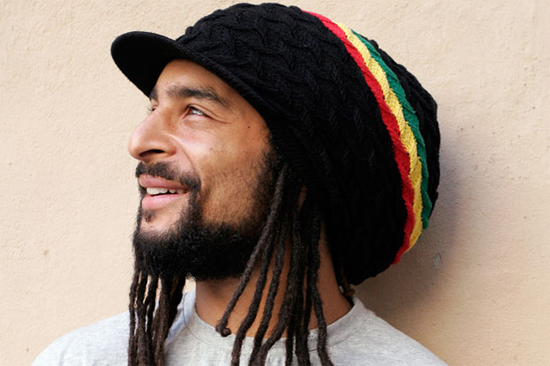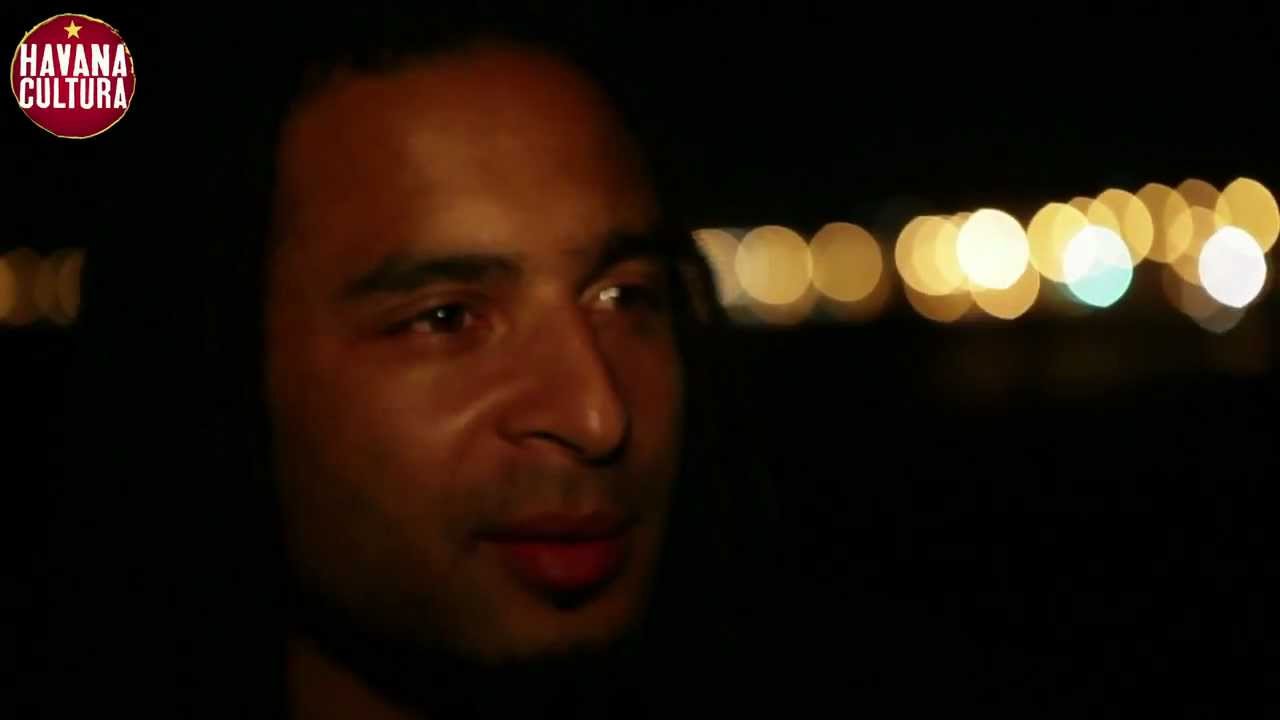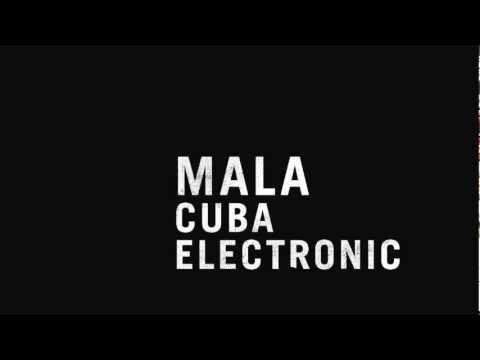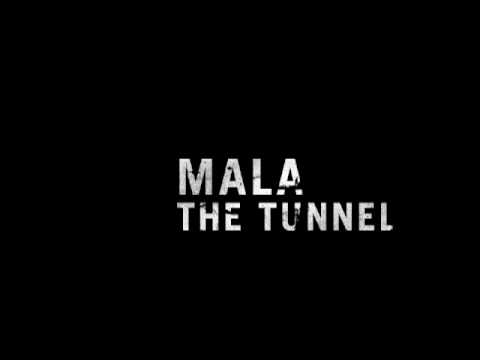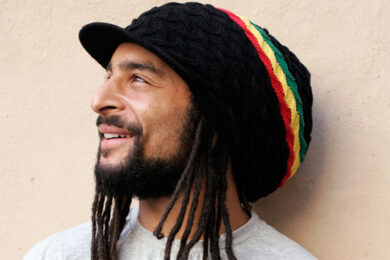Mala is a man with zero pretensions but a knack for sage pronouncements – similes that capture the poetry of a situation in the simplest terms, philosophical tangents that make up in emotional clout what they perhaps lack in conceptual clarity.
He also happens to be one of dubstep’s founding figures. As one half of the Digital Mystikz production duo with Coki, and one third of promoters DMZ, he presided over many of the vertiginous leaps forward that propelled the genre from Croydon obscurity to global renown over the past decade. And while most of the original lot have splintered off to follow their own professional and creative trajectories, Mala seems to remain grounded in the sound and sensibility of years past. Improbably, this makes him a source of rejuvenation rather than regression: each Mala release (and they’re often pretty thin on the ground) is like a shot in the arm for a scene armpit-deep in second-rate ideas.
For the latest instalment in his collaboration with Havana Cultura – a project to evangelise Cuban music to the rest of the world through compilations, tours and the like – Gilles Peterson wanted to approach things a little differently. His solution was to invite Mala out to Cuba to collaborate with local musicians on a release of some form. The result, a good deal of time later, is Mala In Cuba: the producer’s first proper album to date (2010’s Return II Space was more of a mini-album), and one of the most significant statements to come out of dubstep in years. It’s an attractive record, hovering somewhere between the urbane internationalism of Peterson’s Brownswood label and the grittier confines of the South London. Peterson has described it as "the record that reevaluates and realigns the dubstep movement within soundsystem culture" – a grand claim, but one which goes some way to articulating the scale of impact this record could have on a scene that’s felt somewhat rudderless for a while now.
In discussing the project, Mala speaks in a way which is thorough and workmanlike – methodical rather than mercurial – but peppered with surprising and lucid insights, shafts of light that will come back to warm you as you go about your day. Perhaps there’s a parallel to be drawn with the man’s creative process: concerned with the nuts and bolts as much as – if not more than – the bigger picture; happy simply making, applying a bit of elbow grease, without worrying too much about the trappings of fame and fortune. But out of this comes a consistent freshness – brilliance, if we’re feeling proclamatory – that most of dubstep’s leading lights have struggled to achieve more than once or twice in their careers. The crux of it is this: when Mala says there’s "so much still to be explored and discovered" within dubstep’s basic framework, you actually believe him. And surely that in itself is some kind of miracle.
It’d be good to start by talking about the Cuba project. How did it come about – you were approached by Gilles, presumably?
Mala: Yeah, Gilles had been working on a project in Cuba with Havana Cultura for a couple of years. We sat down and had a conversation, and he said he’d been umming and aahing about what to do for the next project – but he wanted to make it a little bit different. At first he said he was thinking about taking over a handful of producers to make a collaborative album with the Cuban musicians. But he said, "When it came down to it, I thought I’d just take you out there". So, I feel very lucky to be picked! But it really was just… he phoned me one afternoon, said ‘have you got time to meet up?’. Obviously I was intrigued, we sat down in a small pub near London Bridge, had a pint of Guinness and discussed what it is that he’d experienced in Cuba.
You’ve mentioned in the past you don’t like the idea of doing an album at all. What was it about this project that felt right?
Mala: [thinks] It’s difficult to pinpoint, to be honest with you. Even when we embarked on our first trip out there we had absolutely no idea what we were going to do, who we were going to work with, what studio we were going to work in. Gilles had been playing mine and Coki’s music over the years, he’d invited me previously to do a couple of radio shows with him at the BBC and for his Brownswood podcast, and he’d been to DMZ himself. So I guess there was some sort of mutual respect and, perhaps, a direct and indirect connection that we’d had over a number of years.
I’m one of those people that – I don’t want to say I’m skeptical, I don’t believe I’m a skeptical person – but I like to do things for the right reasons, and I had to be sure that I wasn’t gonna get out there and dramatically regret making the choice. I didn’t want that to happen – not really for myself but for the people who were investing time and money in it. But it really was just the way Gilles approached me. I don’t know, it just felt right. As much as I felt daunted by the prospect of going to Cuba and working with Cuban musicians, it felt like an opportunity that probably would never ever come round again. So I just had to get over my fear and go for it.
Were you a fan of Cuban music before the project – did you know much about it?
M: No, not particularly. I think most people have heard of Buena Vista Social Club… But really I didn’t know much about Cuban music, or Cuban culture – or anything about Cuba, in all honesty. I said this to Gilles when we met – and that was perhaps one of the reasons why I felt a little bit wary of whether I should go or not, because I felt so uneducated about the situation, in all areas really. The closer I got to the date of going, I remember thinking to myself, ‘Shit, I should be reading some books, or listening to Cuban music, or something…’. But I actually love going into an environment with absolutely no understanding of the place at all. I find that sometimes that’s the best way to exercise your intuition, just like a natural instinct, you know? So I decided, ‘I’m not going to read nothing, I’m not going to listen to nothing, I’m just going to have whatever’s given to me on a plate when I get there, and then work out the best way to go about it’.
So the first time you went was just to check the place out, right?
M: Yeah, that was the plan. The plan was to go in January 2011, and that was going to be like a school trip, so to speak. That ended up being when we met the musicians, which was Roberto Fonseca and his band – and we ended up recording with them as well. What they recorded was just like a hard drive’s worth of music, which I took home, and that basically was my…not really the blueprint for the album, but that was my sample library and my education, so to speak. That was the fundamentals – what I would go to for certain grooves. So the first trip ended up being where we recorded most of what went on my record. Everything was recorded separately so it was really interesting just to listen to perhaps the individual drum sounds – just what the hi-hats were doing, just what the snares were doing.
When you were recording the musicians in the studio, were you directing them at all – or did you just hit record and let them play?
M: Me and Roberto Fonseca, we spoke a bit before we started recording. He said to me, ‘is there anything you wanted in particular?’, and I just said, ‘This is for you guys to exercise in a way, so I can hear what it is that you do naturally’. I asked him to play everything at the tempo that I write music at, which is 140bpm, give or take a few here and there. And after a recording they would say, ‘Mala, how did that sound, were you happy with that?’. But I was dealing with people who were far superior to me, in my opinion, musically – in terms of their understanding – so of course everything they played was alright, you know?
How did you communicate with them, in terms of musical terminology – could you find a common language?
M: Yeah, I spoke with Roberto and he’s well travelled, him and his band tour a lot, so he isn’t just isolated with what’s going on in his environment – he sees what’s going on around the world. There was definitely a common ground, even if it wasn’t musical – in terms of human energy, and… I don’t want to talk about spirituality in terms of religion at all, but just in terms of the human spirit. I think sometimes we connect with people in a way that we don’t necessarily understand, and it doesn’t necessarily mean we speak the same language, but we seem to connect on a level, you know? And I definitely felt that with a number of the musicians that I worked with.
There’s 14 tracks on the album, which is on the long side. Did you have extra ones finished that you didn’t use?
M: Yeah, there’s extra.
So how many do you reckon you got to a reasonably finished state?
M: 25 or so.
Wow. Was it difficult to whittle them down, or was that an obvious decision?
M: Well, the introduction on the CD was something I made with its place in mind. With the talking at the beginning, for me it was like the band was just warming up – you hear the piano, and I guess my bit’s the kick and the subbass, and then it just fades out.
But everything after that came about just by listening to the tracks as we [Mala and collaborator Simbad] were mixing them down, making sense of them that way. That wasn’t really a painful process at all. And even selecting the 14 out of the number that was there wasn’t really an issue, because certain tracks have a certain grain, a certain colour, a certain texture, you know? And some of the other tracks that I made, they’re perhaps more synthetic, in a way. So they’re almost on a different palette.
Also, I started writing tracks for the album after my first trip to Cuba – so by the time of my second trip I probably had already started ten or 15, and I scrapped them and started again. That was going on quite a bit.
To go back to your trips out, what sort of things did you get up to while you were out there, apart from recording?
M: A lot of the time we was in the studio, to be honest with you – we’d be in the studio from 11 in the morning until sometimes 10, 11 o’clock at night – just proper in the lab. But I got to check out some of the music venues there, hear musicians play. I got to see some of old Havana. I didn’t really go out of Havana which is shame. But yeah, I went to a couple of the musicians’ houses, met their folks and ate food with them, stuff like that.
Do they have an electronic dance music culture out there?
M: Yeah they’ve got a dance culture out there, it’s mainly reggaeton and house – more kind of trance. They’ve got a lot of live music, in the clubs and bars. Spanish speaking hip-hop as well – Cuban and South American hip-hop. Some US but not too much.
When you mentioned who you were, had people heard of you?
M: They had no idea man. The first time I played in Cuba, I played in this little house party they got set up, 100 people at this party. Then I went back this year to play a show for the British embassy, and there was 2000 people that had come to see me. In Cuba, when there’s something happening, it spreads, know what I mean? All ages come to check it out.
So when I was there I was calling up and texting everyone from Skream to Joker to Kode9 to Distance, saying, ‘Look, I’m in Cuba, they got none of this music. Can I give everything on my laptop to a couple of people out here who I trust, so they can start playing the music out here?’
Some people were umming and ahhing, and what I had to say to them to put it in context was: if, for example, someone in Cuba wants to download a 128kbps mp3 file of a four minute track, it would take them from about 7pm in the evening ’til about midday the next day. They can’t watch YouTube videos there, you can’t send a high resolution picture of you and your crew while you’re having a good time in Havana – ‘cos they can’t download it. Giving your music to Cuban people is probably the safest it will ever be! It’s really not going anywhere. And these Cubans, they’re passionate people, they’re lively people, especially when it comes to music, and they were digging the music – so I tried to feed them as much as I could.
One way to look at the album is as a meeting of two cultures. Did you feel a responsibility to represent Cuban music and culture in a certain way?
M: [thinks] I did feel a sense of responsibility because I was very, very grateful, and really see it as a blessing to have experienced what I did in Cuba, with the people I was with and the musicians I worked with. They were very open, they were very giving. So I wanted to represent them and where they’d come from as much as possible, but at the same time I had to look at it and think, ‘I’m not a traditional Cuban musician, I can’t make a Cuban-sounding record. I can only really do what I do.’
I guess for me it wasn’t necessarily so much about the music I recorded which motivated and is present on the album, but definitely their energy, [which] I feel is very present on the album. It may be a little hard to decipher or to understand at first, but you know… I played some of the music to some of the Cubans – not necessarily people that I worked with, but other musicians. They could hear that it wasn’t Cuban music but they were like, ‘Rah, I can feel Cuba in there’, you know? I’d like to think I did my best to respect them as much as I possibly could.
In the past you’ve talked about being more interested in the process of making music, exploring in the studio, rather than the finished product. How did you cope with knowing that a release had to come out of this? Was it difficult?
M: Yeah, extremely.
Did you have work-arounds, ways of forcing yourself to make music?
M: Nah, I’m not that type of person – I don’t force it. It was nightmare. I often think about making music as being like creating a maze. And when you create a maze and you’ve got to try and get yourself out of it, it’s even more frustrating because you feel like you know how you should be able to get out of it. But I had to just trust in what I was given – not sonically but, as I say, energetically and spiritually – and just try and feel my way through it.
There was a point at the beginning of this year when I sent an email to Brownswood saying, ‘I’m really sorry but I’m not sure I can finish it!’ [laughs] I’d worked with Simbad previously – we met in Puerto Rico at a festival many years ago now, and we’ve always kept in touch. He’s been one of those guys who I’ve met on my journey, and – you know some people in life, as soon as you meet them it’s like you’ve known them all your life – me and Simbad have that kind of connection. So I just said to him, ‘Maybe you can come over and listen to what’s going on’. He’s one of them honest guys as well, that will tell it straight, and I really needed that. Just having someone else in the studio sitting down listening, even with him not saying anything, it totally gives you a different perspective on what you’re listening to.
That’s what I needed really – to be around someone else to bounce energy and bounce ideas off. Because it’s a very isolated experience working on a project on your own, it’s like being underwater for a year and then popping your head out and trying to make sense of where you’ve just popped out – it’s kind of confusing. Having someone else there, and especially Simbad, totally gave me my objectivity back. So we ended up just vibing on a load of tracks. Hence why he has writer’s credit on there, because it got to a point where, with some of the tracks, we just totally transformed them overnight.
It was a massive learning experience. Opening up and letting somebody in, as scary as it can be or as uncomfortable as it can feel, when you let the right people in it’s actually nothing but a blessing, you know? It enhances what you’re about, enhances your ability and your understanding of self and everything around you. And it really was a blessing working with Simbad – and with Gilles, having that trust and confidence in what I was doing.
I wanted to talk about your music in more general terms. You mentioned earlier that most of the tracks on the album are around 140bpm. I know you don’t like the term particularly, but most of them could be described as ‘dubstep’. Are you conscious of still trying to preserve or promote a certain culture? Is that in your head when you’re thinking, ‘What tempo am I going to write at? Which tracks am I going to release?’
M: Nah. It’s not a thought, it’s just a feeling. There’s so much still to be explored and discovered at this tempo. In terms of the sonic design of the music, I like it to sound heavy in the bottom end. So it’s not like I’m trying to preserve a culture – this is just naturally how I go about writing music. I guess what this album’s done is find ways of incorporating other things into what it is that I do – expanding that horizon, rather than with a new plugin or a new synthesiser, actually working with musicians. They give something that you can’t give. But no, I was never thinking to myself, ‘I’ve got to keep it at 140, I’ve got to make the music that people know me for’. I find my feelings always dominate the outcome, it’s never my thoughts about what it should be, or what people will think… I just have to go with how I feel at the time.
I read that you’ve made a lot of music at other tempos over the years – slower stuff – but that it just hasn’t seen release. There’s one slower track on the album, but apart from that, do you still play around with slower tempos?
M: Yeah, all the time. But for me, just because you finish a piece of music, it doesn’t mean you have to release it. Some things are just for the self, as a training kind of thing – or almost like a diary that you don’t share. People don’t go around posting their diary notes up online for everybody to read, know what I mean? There’s some things in life that people like to keep for themselves. And it’s not for a selfish reason, it’s just because that’s the way it is. It’s their thoughts, their feelings, their expressions, their agonies and their pains, their joys and their happiness, their failures and their successes. So with my hard drives in my studio, that’s what it is – in a way it’s the diary of the last decade of my life. As abstract as it may be to listen to [laughs], and not that anyone could necessarily make sense of what I was thinking or feeling at the time. But some things are just… They’re never gonna go out of the hard drive. And that’s just the way it is.
Working with live musicians has clearly been a really important new experience for you. Do you feel like this album has sent you in a new direction? Is this a new era for Mala?
M: I really don’t know what’s going to come after this. In terms of spirit and message, the path is a long path that one has to continue down. But how you walk down that path can always change depending on the tools that you have, and your perspective. This album has definitely given me new tools to work with and given me a new perspective. So perhaps it is some sort of new era, but I don’t really see things as new and old – it’s just a continuation of what is, you know?

